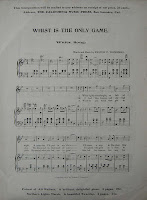The first example, pictured below, is a single folded sheet with two engraved pages of music. It is called The Odd Trick or Imperial Game at Whist. A favorite song sung at the Corporation Feast, Sheffield. The music was written by Luke Proctor and the lyrics by W. Battie and was sold by Joseph Dale at his Music and Instrument Warehouses. Dale was a printer, bookseller, publisher, and also made and sold musical instruments. The song was entered at Stationers Hall, so with some work I can establish a publication date, but the text dates it to the time of the Napoleonic Wars.
 |
| The Odd Trick Levy [0014] |
The song uses many whist terms metaphorically, including the phrase in the title "odd trick." Each whist deal consists of thirteen tricks and the side winning the most tricks scores a point for each trick in excess of six. The seventh trick, then, is the most valuable. It is in effect worth two points as it changes the score from minus one to plus one. In whist, the seventh trick is known as the "odd trick," giving title to the song. Other whist terms abound: game, dealing, trumps, honours, etc.
The ODD TRICK, or Imperial Game at WHIST.
While others on taxes and politics prate,
Neglecting their own affairs of the state,
Such folly I wish to avoid in my rhymes,
I only intend a slight hint on the times.
The French against Europe have play'd a hard game,
Tho' odds went against them at dealing the same;
So strong in their trumps, and they play 'em so quick,
The game had been theirs, had they got the Odd Trick.
To gain this odd trick the french gamesters alert,
By fraud, force, or cunning, their skill do exert;
Her partners have yielded, yet Britain no doubt
Will try single-handed to see the game out.
They boast they can beat us, but numbers made bold,
Tho' stronger in trumps, yet more honours we hold;
Vain all their attempts British Isles to enslave,
We have Ace, King and Queen, they only the Knave.
The game of invasion they yet may revoke,
For who can depend on such whimsical folk,
Republicans once, now for monarchy sing,
And are busy transforming their knave to a king.
Kings, laws, and religion, like madmen enrag'd,
To abolish throughout the whole world they engag'd;
And threaten'd all kingdoms should be overthrown
Now submit to a non-freeman king of their own.
For Boney, who thirsts after blood like a shark,
Was illegally bound, and now strikes a false mark;
By help of some new fangled patterns he made,
Got his masters old shop, and began the same trade.
Half Europe he governs with absolute sway,
And threatens Old England shall soon be his prey;
But should he attempt i, with blows hard and thick,
Ev'ry Briton, I hope, will defend the odd trick.
 |
| Whist is the Only Game Levy [1552] |
Jumping ahead more than a century, we turn from politics to the battle of the sexes. The song is Whist is the Only Game by Weston P. Truesdell, San Leandro: California Music Press, 1911. Truesdell (1860-1914) was a San Francisco journalist and the author of the book Whist Don'ts, 1914. The sheet music cover at left, shows a home whist game, with some tension between one of the couples.
Notice that a deal at whist is displayed in the border, with the caption:
Hand at the top was my partner's. Hand at the bottom was mine. Hearts were Trump. Ace of Diamonds Led. We should have made eleven tricks. We made seven. I couldn't find a policeman to tell my troubles to, so I wrote this song.I transcribe the hand below. Evidently North was the dealer and turned a heart for trump, placing East on lead. As Truesdell notes, eleven tricks are available on a cross-ruff (Hoyle would have called it a "see-saw") with North trumping spades and South diamonds. Even if East leads a heart, restricting NS to ten trump tricks, South can trump four diamonds, setting up the last as a winner for the eleventh trick.
S -
H - A K Q J T 3
D - 8 5 4 3 2
C - 9 6
S - A K 4 S - Q T 5 2
As we follow the lyrics, we see that Mrs. Truesdell had other ideas for playing the hand:
When lights shine bright, at fall of night,
A quarter I'll put in my clo'es,
I'll chase a-way to the place they play
That swell game that ev'ry one knows.
A partner I had one fateful night,
Her pink waist was glad but she played like a fright!
She'd lead a sneak and she'd trump my ace,
If I dared to speak she'd slap my face.
Oh! whist is the only game.
 | |
| Whist is the Only Game (music) |
Whist, whist, whist,
Oh! whist is the only game.
I never win, I lose my tin,
But I love it just the same.
Long suit, short suit,
Not a trump in my fist,
I throw my money to the birds
When I play whist.
I had five trumps, and six had she,
No diamond in that hand of mine,
I laugh with glee as I said to me,
Oh! Here is the place that I shine.
A diamond they led, a fierce big ace,
I killed it quite dead, tho' it was a disgrace.
A little spade then I led my pard,
And the trick we made, she trumped the card.
Oh! Whist is the only game.
[repeat chorus]
What do you think that girl in pink
Returned when she led out again?
She led her trumps, her ace, her king,
Her queen and her jack and her ten.
'Tis seven years since that dreadful game,
The girl who wore pink is now wearing my name,
Six little trumps in our cottage play,
That's the winning score we count today.
Oh! Whist is the only game.
[repeat chorus]
This was not very clever play on the part of Mrs. Truesdell, but at least her partnership still made the odd trick! I wonder if the descendents of the Truesdells and their "six little trumps" know of this song today.
Enough of whist in song—do give some thought to the challenge of choreographing a game of whist for the stage!




No comments:
Post a Comment